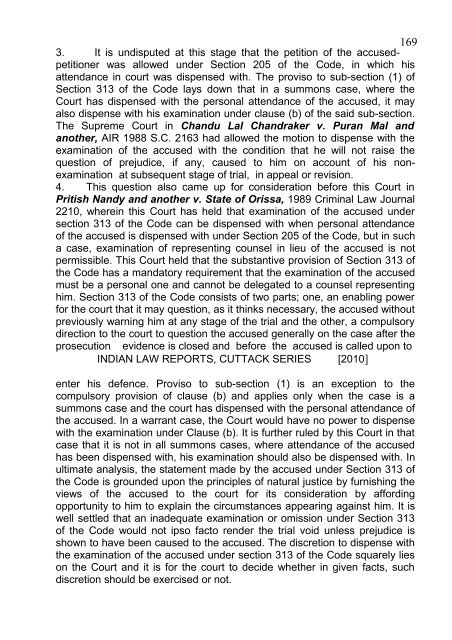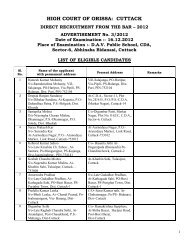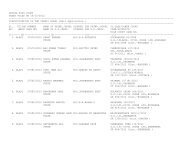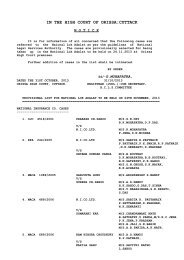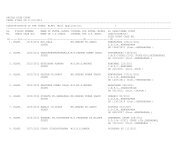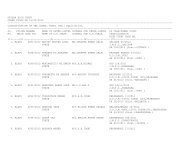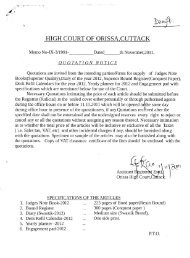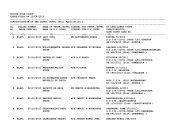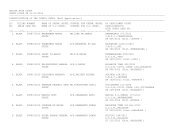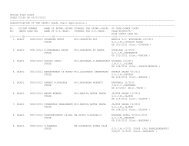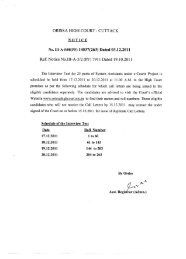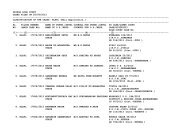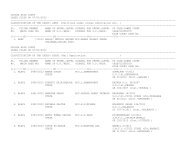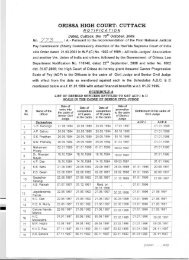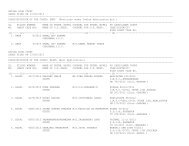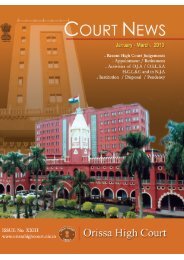ORIGINAL JURISDICTION - Orissa High Court
ORIGINAL JURISDICTION - Orissa High Court
ORIGINAL JURISDICTION - Orissa High Court
You also want an ePaper? Increase the reach of your titles
YUMPU automatically turns print PDFs into web optimized ePapers that Google loves.
169<br />
3. It is undisputed at this stage that the petition of the accusedpetitioner<br />
was allowed under Section 205 of the Code, in which his<br />
attendance in court was dispensed with. The proviso to sub-section (1) of<br />
Section 313 of the Code lays down that in a summons case, where the<br />
<strong>Court</strong> has dispensed with the personal attendance of the accused, it may<br />
also dispense with his examination under clause (b) of the said sub-section.<br />
The Supreme <strong>Court</strong> in Chandu Lal Chandraker v. Puran Mal and<br />
another, AIR 1988 S.C. 2163 had allowed the motion to dispense with the<br />
examination of the accused with the condition that he will not raise the<br />
question of prejudice, if any, caused to him on account of his nonexamination<br />
at subsequent stage of trial, in appeal or revision.<br />
4. This question also came up for consideration before this <strong>Court</strong> in<br />
Pritish Nandy and another v. State of <strong>Orissa</strong>, 1989 Criminal Law Journal<br />
2210, wherein this <strong>Court</strong> has held that examination of the accused under<br />
section 313 of the Code can be dispensed with when personal attendance<br />
of the accused is dispensed with under Section 205 of the Code, but in such<br />
a case, examination of representing counsel in lieu of the accused is not<br />
permissible. This <strong>Court</strong> held that the substantive provision of Section 313 of<br />
the Code has a mandatory requirement that the examination of the accused<br />
must be a personal one and cannot be delegated to a counsel representing<br />
him. Section 313 of the Code consists of two parts; one, an enabling power<br />
for the court that it may question, as it thinks necessary, the accused without<br />
previously warning him at any stage of the trial and the other, a compulsory<br />
direction to the court to question the accused generally on the case after the<br />
prosecution evidence is closed and before the accused is called upon to<br />
INDIAN LAW REPORTS, CUTTACK SERIES [2010]<br />
enter his defence. Proviso to sub-section (1) is an exception to the<br />
compulsory provision of clause (b) and applies only when the case is a<br />
summons case and the court has dispensed with the personal attendance of<br />
the accused. In a warrant case, the <strong>Court</strong> would have no power to dispense<br />
with the examination under Clause (b). It is further ruled by this <strong>Court</strong> in that<br />
case that it is not in all summons cases, where attendance of the accused<br />
has been dispensed with, his examination should also be dispensed with. In<br />
ultimate analysis, the statement made by the accused under Section 313 of<br />
the Code is grounded upon the principles of natural justice by furnishing the<br />
views of the accused to the court for its consideration by affording<br />
opportunity to him to explain the circumstances appearing against him. It is<br />
well settled that an inadequate examination or omission under Section 313<br />
of the Code would not ipso facto render the trial void unless prejudice is<br />
shown to have been caused to the accused. The discretion to dispense with<br />
the examination of the accused under section 313 of the Code squarely lies<br />
on the <strong>Court</strong> and it is for the court to decide whether in given facts, such<br />
discretion should be exercised or not.


